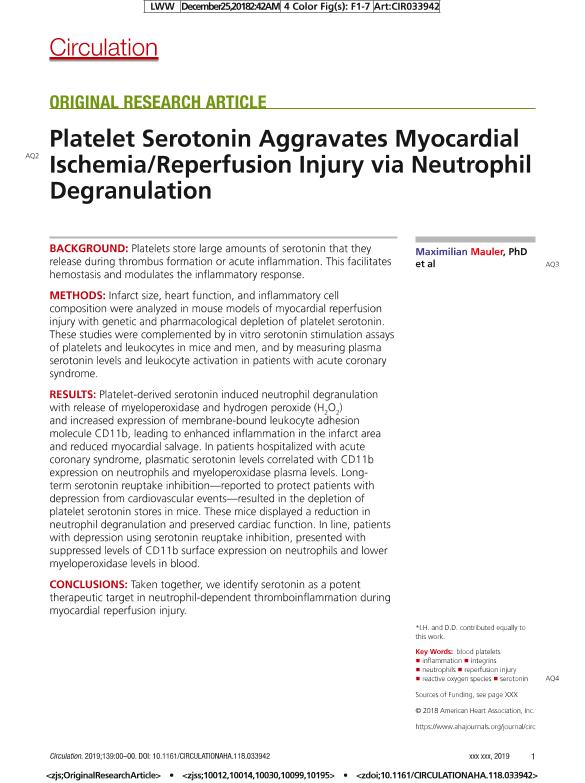Mostrar el registro sencillo del ítem
dc.contributor.author
Mauler, Maximilian
dc.contributor.author
Herr, Nadine
dc.contributor.author
Schoenichen, Claudia
dc.contributor.author
Witsch, Thilo
dc.contributor.author
Marchini, Timoteo Oscar

dc.contributor.author
Härdtner, Carmen
dc.contributor.author
Koentges, Christoph
dc.contributor.author
Kienle, Korbinian
dc.contributor.author
Ollivier, Véronique
dc.contributor.author
Schell, Maximilian
dc.contributor.author
Dorner, Ludwig
dc.contributor.author
Wippel, Christopher
dc.contributor.author
Stallmann, Daniela
dc.contributor.author
Normann, Claus
dc.contributor.author
Bugger, Heiko
dc.contributor.author
Walther, Paul
dc.contributor.author
Wolf, Dennis
dc.contributor.author
Ahrens, Ingo
dc.contributor.author
Lämmermann, Tim
dc.contributor.author
Ho-Tin-Noé, Benoît
dc.contributor.author
Ley, Klaus
dc.contributor.author
Bode, Christoph
dc.contributor.author
Hilgendorf, Ingo
dc.contributor.author
Duerschmied, Daniel
dc.date.available
2021-06-09T16:49:48Z
dc.date.issued
2019-02
dc.identifier.citation
Mauler, Maximilian; Herr, Nadine; Schoenichen, Claudia; Witsch, Thilo; Marchini, Timoteo Oscar; et al.; Platelet Serotonin Aggravates Myocardial Ischemia/Reperfusion Injury via Neutrophil Degranulation; Lippincott Williams; Circulation; 139; 7; 2-2019; 918-931
dc.identifier.issn
0009-7322
dc.identifier.uri
http://hdl.handle.net/11336/133518
dc.description.abstract
Background: Platelets store large amounts of serotonin that they release during thrombus formation or acute inflammation. This facilitates hemostasis and modulates the inflammatory response. Methods: Infarct size, heart function, and inflammatory cell composition were analyzed in mouse models of myocardial reperfusion injury with genetic and pharmacological depletion of platelet serotonin. These studies were complemented by in vitro serotonin stimulation assays of platelets and leukocytes in mice and men, and by measuring plasma serotonin levels and leukocyte activation in patients with acute coronary syndrome. Results: Platelet-derived serotonin induced neutrophil degranulation with release of myeloperoxidase and hydrogen peroxide (H2O2) and increased expression of membrane-bound leukocyte adhesion molecule CD11b, leading to enhanced inflammation in the infarct area and reduced myocardial salvage. In patients hospitalized with acute coronary syndrome, plasmatic serotonin levels correlated with CD11b expression on neutrophils and myeloperoxidase plasma levels. Long-term serotonin reuptake inhibition - reported to protect patients with depression from cardiovascular events - resulted in the depletion of platelet serotonin stores in mice. These mice displayed a reduction in neutrophil degranulation and preserved cardiac function. In line, patients with depression using serotonin reuptake inhibition, presented with suppressed levels of CD11b surface expression on neutrophils and lower myeloperoxidase levels in blood. Conclusions: Taken together, we identify serotonin as a potent therapeutic target in neutrophil-dependent thromboinflammation during myocardial reperfusion injury.
dc.format
application/pdf
dc.language.iso
eng
dc.publisher
Lippincott Williams

dc.rights
info:eu-repo/semantics/openAccess
dc.rights.uri
https://creativecommons.org/licenses/by-nc-sa/2.5/ar/
dc.subject
BLOOD PLATELETS
dc.subject
INFLAMMATION
dc.subject
INTEGRINS
dc.subject
NEUTROPHILS
dc.subject
REACTIVE OXYGEN SPECIES
dc.subject
REPERFUSION INJURY
dc.subject
SEROTONIN
dc.subject.classification
Sistemas Cardíaco y Cardiovascular

dc.subject.classification
Medicina Clínica

dc.subject.classification
CIENCIAS MÉDICAS Y DE LA SALUD

dc.title
Platelet Serotonin Aggravates Myocardial Ischemia/Reperfusion Injury via Neutrophil Degranulation
dc.type
info:eu-repo/semantics/article
dc.type
info:ar-repo/semantics/artículo
dc.type
info:eu-repo/semantics/publishedVersion
dc.date.updated
2020-11-06T20:28:21Z
dc.journal.volume
139
dc.journal.number
7
dc.journal.pagination
918-931
dc.journal.pais
Estados Unidos

dc.journal.ciudad
Philadelphia
dc.description.fil
Fil: Mauler, Maximilian. No especifíca;
dc.description.fil
Fil: Herr, Nadine. No especifíca;
dc.description.fil
Fil: Schoenichen, Claudia. No especifíca;
dc.description.fil
Fil: Witsch, Thilo. No especifíca;
dc.description.fil
Fil: Marchini, Timoteo Oscar. Consejo Nacional de Investigaciones Científicas y Técnicas. Oficina de Coordinación Administrativa Houssay. Instituto de Bioquímica y Medicina Molecular. Universidad de Buenos Aires. Facultad Medicina. Instituto de Bioquímica y Medicina Molecular; Argentina
dc.description.fil
Fil: Härdtner, Carmen. No especifíca;
dc.description.fil
Fil: Koentges, Christoph. No especifíca;
dc.description.fil
Fil: Kienle, Korbinian. Max Planck Institute Of Immunobiology And Epigenetics; Alemania
dc.description.fil
Fil: Ollivier, Véronique. Inserm; Francia
dc.description.fil
Fil: Schell, Maximilian. No especifíca;
dc.description.fil
Fil: Dorner, Ludwig. No especifíca;
dc.description.fil
Fil: Wippel, Christopher. No especifíca;
dc.description.fil
Fil: Stallmann, Daniela. No especifíca;
dc.description.fil
Fil: Normann, Claus. No especifíca;
dc.description.fil
Fil: Bugger, Heiko. No especifíca;
dc.description.fil
Fil: Walther, Paul. Universitat Ulm; Alemania
dc.description.fil
Fil: Wolf, Dennis. La Jolla Institute for Allergy and Immunology; Estados Unidos
dc.description.fil
Fil: Ahrens, Ingo. No especifíca;
dc.description.fil
Fil: Lämmermann, Tim. Max Planck Institute Of Immunobiology And Epigenetics; Alemania
dc.description.fil
Fil: Ho-Tin-Noé, Benoît. Inserm; Francia
dc.description.fil
Fil: Ley, Klaus. La Jolla Institute for Allergy and Immunology; Estados Unidos
dc.description.fil
Fil: Bode, Christoph. No especifíca;
dc.description.fil
Fil: Hilgendorf, Ingo. No especifíca;
dc.description.fil
Fil: Duerschmied, Daniel. No especifíca;
dc.journal.title
Circulation
dc.relation.alternativeid
info:eu-repo/semantics/altIdentifier/doi/http://dx.doi.org/10.1161/CIRCULATIONAHA.118.033942
Archivos asociados
